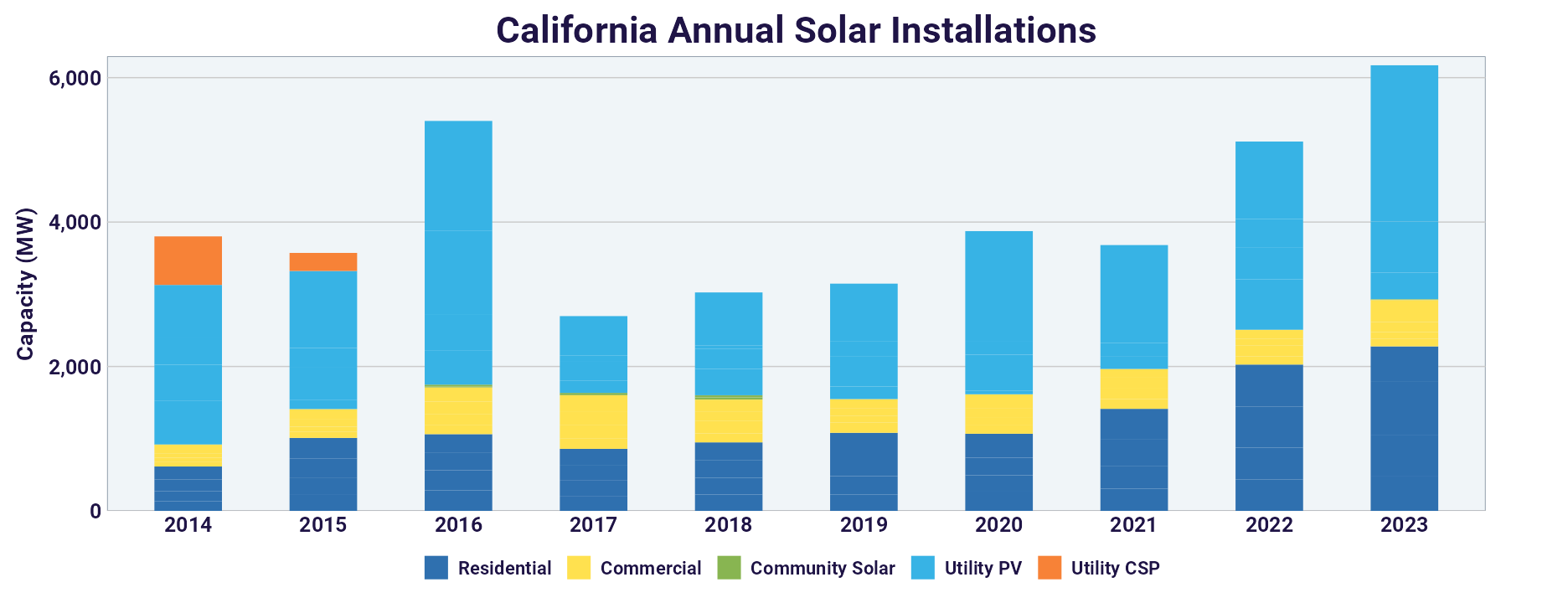Solar Careers in California

California has been the leader in solar installations for several decades and the industry is still growing. With the state's commitment to clean energy and carbon emission reduction, the California solar industry is projected to create a thousands of new jobs in the next ten years. Although California implemented a very significant change to its solar net metering policy in 2023, new solar installations are still predicted to grow substantially through 2030 and beyond.

Job Market Overview
California led the nation in solar employment with over 78,000 jobs in 2022 according to Interstate Renewable Energy Council's Solar Jobs Census. This doesn't include electricians that work in solar. The state's solar job market is diverse, ranging from installation, project development, engineering, R&D, to sales and manufacturing. Installation jobs make up nearly 65% of all solar jobs, followed by project development at 14%, and sales and distribution at 12%.
Solar job opportunities in California's are expected to continue growing significantly. By 2030, the number of solar jobs is predicted to double, driven by the state's ambitious renewable energy goals. California's current goals are:
- 90% clean electricity by 2035
- 95% clean electricity by 2040
- 100% clean electricity by 2045.
Solar Job Training Opportunities
For those interested in beginning a career in solar, or transitioning into a new role, there are numerous opportunities for in-person or online learning. If you are interested in solar installation or technician jobs, I highly recommended getting North American Board of Certified Energy Practitioners (NABCEP) certirfied. NABCEP certification which is known and respected throughout the industry, and the organization offers a variety of certifications for solar system installation and sales professionals. I often recommend that people start with a course like the 18-Hour Solar Bootcamp from Heatspring which is one of the top solar education providers.
California offers a variety of training programs, from trade schools and community colleges to universities. Community colleges, like Los Angeles Trade-Tech College, provide courses in renewable energy technology. Below is partial list from the State of California showing some colleges that deliver state reviewed solar energy training programs.
| College | Program |
| College of the Redwoods | Solar Energy Technology/Technician |
| Cerro Coso Community College | Solar Energy Technology/Technician |
| University of La Verne | Solar Energy Technology/Technician |
| Santa Monica City College | Solar Energy Technology/Technician |
| Golden West College | Solar Energy Technology/Technician |
| San Diego City College | Solar Energy Technology/Technician |
| Shasta Builders` Exchange Training Center | Solar Energy Technology/Technician |
| Diablo Valley College | Solar Energy Technology/Technician |
Universities, such as Stanford and UC Berkeley, also offer advanced degrees in energy engineering and environmental science.
State and Local Job Training Resources
In addition to educational institutions, California also provides state and local job training resources. The Employment Development Department (EDD) offers resources like the "CalJOBS" system, a platform for job seekers and employers in the solar industry. Local workforce development boards offer training and employment services tailored to the needs of their respective communities.
GRID Alternatives periodically offers job training that is sometimes free for individuals meeting certain income requirements. One example is from the Central Valley branch: Solar Installation Training with GRID Alternatives Central Valley
The Future of the Solar Industry in California
The future of California's solar industry looks bright. With the state's goal to supply 100% clean energy by 2045, the demand for solar energy and the jobs that come with it is set to increase.
The opportunities for solar job seekers in California will continue to grow, matching the predicted growth in the industry. With so many resources and training programs available, there's never been a better time to consider a career in solar energy.
Find your next solar job in California!
What do you think? Join the discussion and post your comments below!





